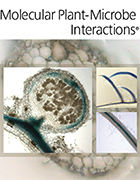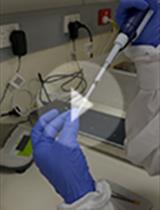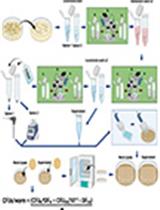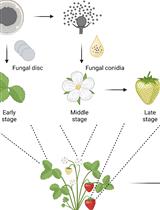- EN - English
- CN - 中文
Root-knot Nematode Penetration and Sclareol Nematicidal Activity Assays
根结线虫的渗透和香紫苏醇杀线虫的活性分析
发布: 2016年06月20日第6卷第12期 DOI: 10.21769/BioProtoc.1848 浏览次数: 10641
评审: Zhaohui LiuKrzysztof WieczorekAnonymous reviewer(s)
Abstract
Plant parasitic nematodes parasitize roots and/or stems of various plants thereby inhibiting absorption of nutrients and moisture. In particular, root-knot nematodes (RKN) are a group of the most devastating pests. Various techniques, such as soil sterilization, cultivation of resistant crops, and chemical application, have been developed to control damage caused by RKN. Among these techniques, diminish by chemicals that induce or activate host defense to RKN is an attractive method because of its potential to reduce the environmental burden caused by crop protection. Sclareol, a diterpene, was identified as a chemical that induces resistance to RKN (Fujimoto et al., 2015). Here we provide a protocol for assessing the impact of sclareol on the penetration of RKNs into tomato and Arabidopsis roots and the direct nematicidal impact of the chemical on nematodes. This protocol can be used for other nematode resistance-inducing chemicals.
Keywords: Root-knot nematode (根结线虫病)Materials and Reagents
- 220 ml bottom opened plastic pot
- Glass petri dish, 9 cm in diameter
Note: not necessary sterilized - Sterilized 50 ml glass culture bottle with cap
- 1 ml glass pipette
Note: Polypropylene pipette tips tend to retain Root-knot nematode (RKN), hence use of such tips should be avoided. - Sterilized 24-well tissue culture plate (e.g., IWAKI, catalog number: 3820-024 )
- RKN Meloidogyne incognita (NIAS Genebank, MAFF number: 108258 )
Note: We obtained a strain 108258 of RKN from the MAFF gene bank of the National Institute of Agrobiological Sciences of Japan (http://www.gene.affrc.go.jp/about_en.php). This strain can survive and propagate on plants carrying Mi-genes for RKN resistance (resistance breaking strain). - Tomato (Solanum lycopersicum), cultivar Momotaro
Note: The cultivar Momotaro carries Mi-genes for RKN resistance. Seeds of tomato cultivars possessing Mi-genes (e.g., Momotaro) can be obtained from a seed company (Takii & Co. Ltd., Kyoto, Japan). - Arabidopsis thaliana (Columbia)
- Water (Milli-Q grade)
- Sodium hypochlorite solution (Nacalai Tesque, catalog number: 31518-35 )
- Ethanol (99.5%) (Nacalai Tesque, catalog number: 09666-85 )
- Sea sand with an average size of 0.3 mm
Note: Shift and wash sea sand to remove the pebbles and the salt with a large amount of tap water in a metal tub and autoclave the washed sand. - Liquid fertilizer (Hyponex)
- Methanol (99.8%) (Nacalai Tesque, catalog number: 21915-93 )
- Acid fuchsin (e.g., Sigma-Aldrich, catalog number: F8129-25G , or Wako, catalog number: 061-01332 )
- Lactic acid (85~92%) (Nacalai Tesque, catalog number: 20006-75 )
- Glycerol (99%) (Nacalai Tesque, catalog number: 17018-83 )
- Sclareol (Sigma-Aldrich, catalog number: 357995-1G )
- Sodium hydroxide (Nacalai Tesque, catalog number: 31511-05 )
- Acetic acid (99%) (Nacalai Tesque, catalog number: 00211-95 )
- Acid fuchsin solution (see Recipes)
- 100 mM sclareol solution (see Recipes)
Equipment
- Greenhouse or chamber for plant growth
- Stainless tweezer
- Incubator (e.g., Sibata, model: SMU-0541 )
- Light microscope (e.g., OLYMPUS, model: BX53M )
- Refrigerator (e.g., PANASONIC, model: MPR-162DCN )
- Stainless steel tray (9.2 cm in height x 18 cm depth x 32 cm width)
- Scissors (e.g., V. Mueller, catalog number: 25601-164 )
- Water bath (e.g., Taitec, model: SH-10N )
Note: You can also use a commercially available microwave oven for cooking. - Microwave oven (e.g., HITACHI, model: MRO-NT5 )
- Stereoscopic microscope (e.g., Nikon, model: SMZ-U )
Procedure
文章信息
版权信息
© 2016 The Authors; exclusive licensee Bio-protocol LLC.
如何引用
Fujimoto, T., Mizukubo, T., Abe, H. and Seo, S. (2016). Root-knot Nematode Penetration and Sclareol Nematicidal Activity Assays. Bio-protocol 6(12): e1848. DOI: 10.21769/BioProtoc.1848.
分类
植物科学 > 植物免疫 > 病害生物测定
微生物学 > 微生物-宿主相互作用 > 线虫
您对这篇实验方法有问题吗?
在此处发布您的问题,我们将邀请本文作者来回答。同时,我们会将您的问题发布到Bio-protocol Exchange,以便寻求社区成员的帮助。
提问指南
+ 问题描述
写下详细的问题描述,包括所有有助于他人回答您问题的信息(例如实验过程、条件和相关图像等)。
Share
Bluesky
X
Copy link












